Purple Ribbons: Alice
Reality of life and loss for people affected by Alzheimer's
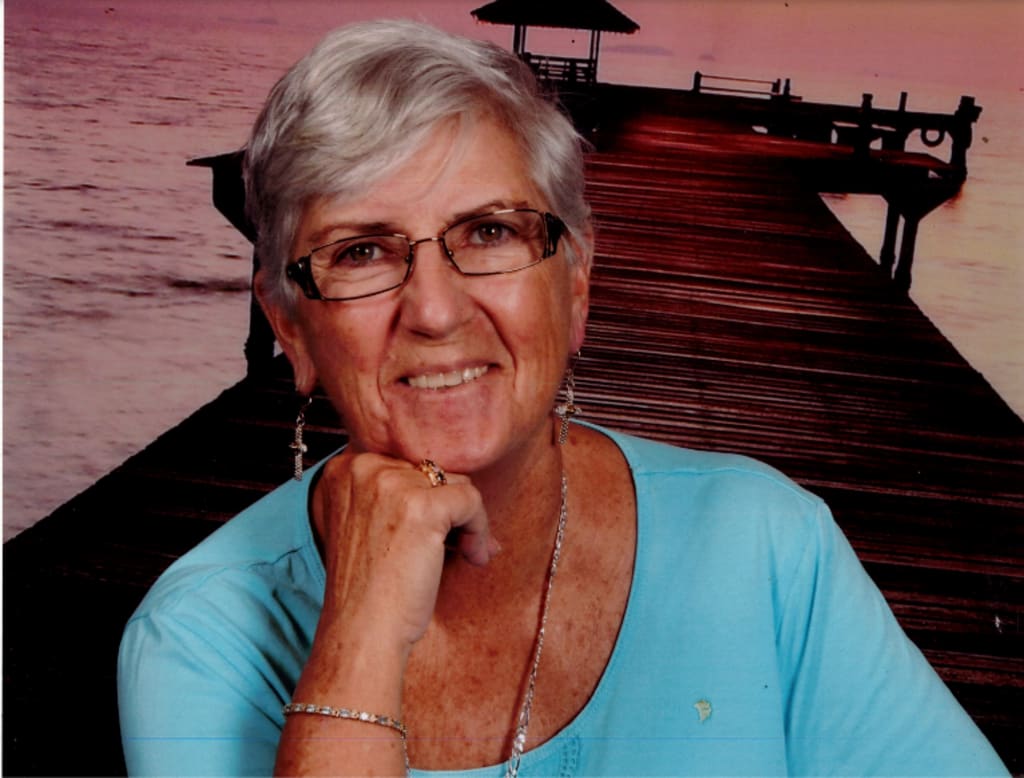
(Dedicated to our Alice in Wonderland)
Come along with me as I interview the families impacted by this disease. Along the way, we may learn something important or let others know they're not alone in their struggle.
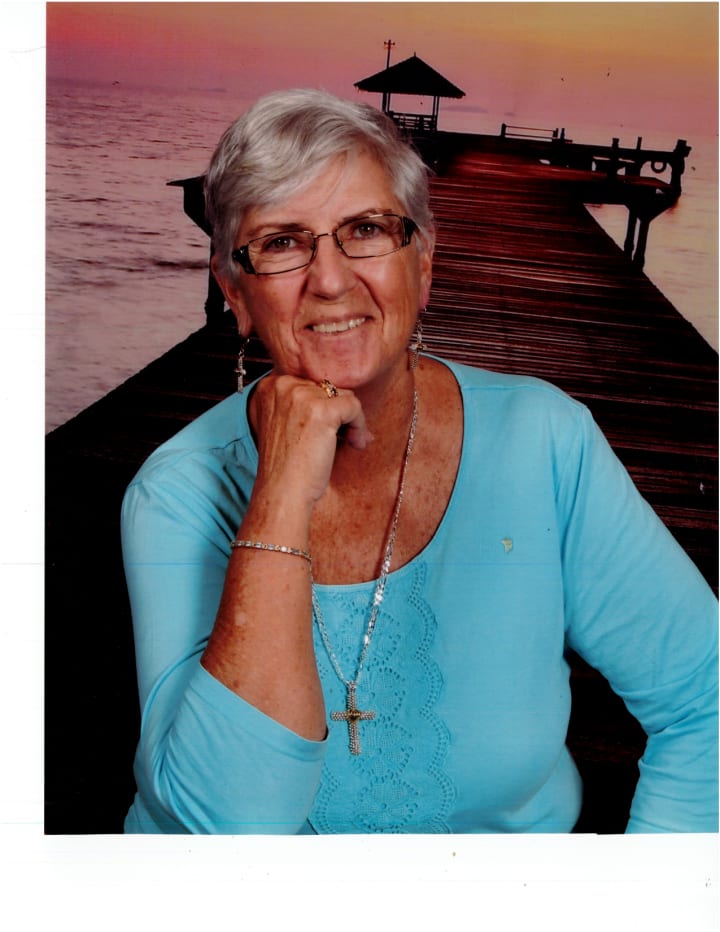
I sat down with Jim M., long-time husband of Alice M., as well as her sister Maria to unfold the impact that Alzheimer's disease has had on their lives. A = Jim's answer. Maria = Maria's answer.
Q: How did you deal with the grief of losing her?
A: It's been almost a year and a half and I still haven't gotten over it. I don't think you ever get over it. There are times you go places and you remember the person. You never get over it. You deal with it, that's all, and move on. In the beginning, when it first happens, it's a major catastrophe, very difficult.
Q: What were the first signs something was wrong?
A: It's little things at first like making a wrong turn. In my wife's case, she didn't know where she was. It's little things that get worse and worse as time goes by.
Q: What do you wish more people knew about Alzheimer's Disease?
A: That it's a real disease and it's very common. Unfortunately, in my wife's case, her body was as healthy as can be, it was only the mind that was gone. It was hard dealing with that.
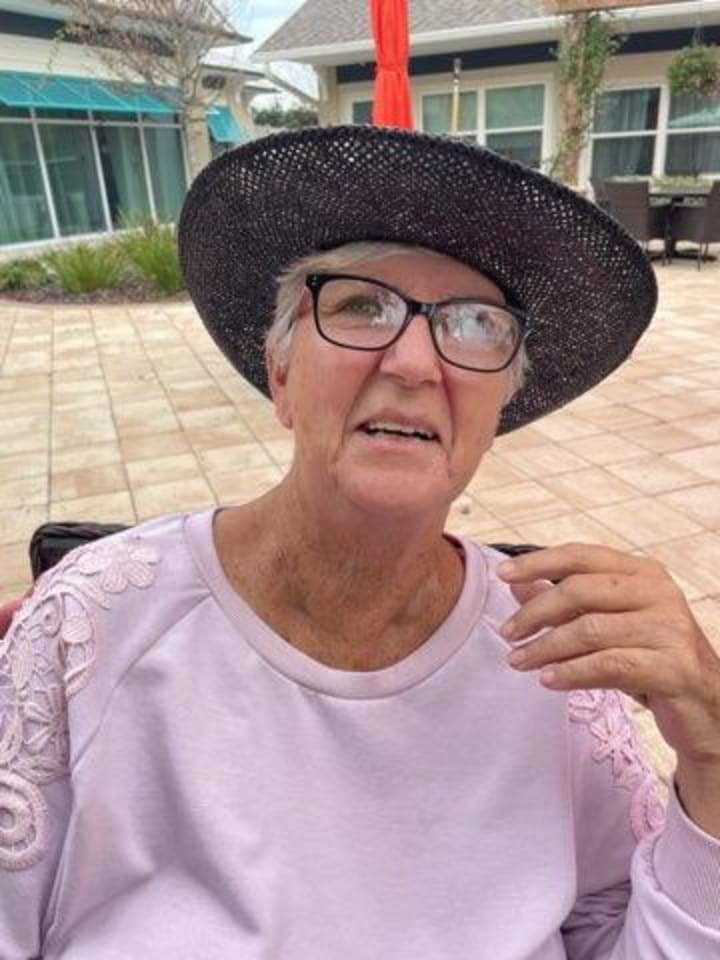
Q: How did you cope with the diagnosis?
A: It was a relief to know why she was acting that way. Five years went by before we had an official diagnosis. That was in 2019 and she passed away in 2023, the last 3 years were when it got bad.
Maria: When Alice didn't remember any of the good things we did together. Like when she was 12 years old and I took her to my friend's house, she met some of my friends. She didn't remember the good times, the picnics, the things we played in the house. For some reason, she thought of the bad things from her childhood.
I said, "Why is she talking to me like that? Why is she bringing things up from when she was a teenager? What is she thinking?" I had no idea and I cried and cried for months. It was never anything, it was in her mind.
We were together all the time laughing, joking, foolin' around. We loved our kids and they grew up together. There was such a change out of nowhere. My sister Alice and I were the closest. I didn't understand why she was being that way until I found out she was not in her right mind when she said those things. We loved each other so much and dealt with a lot together.
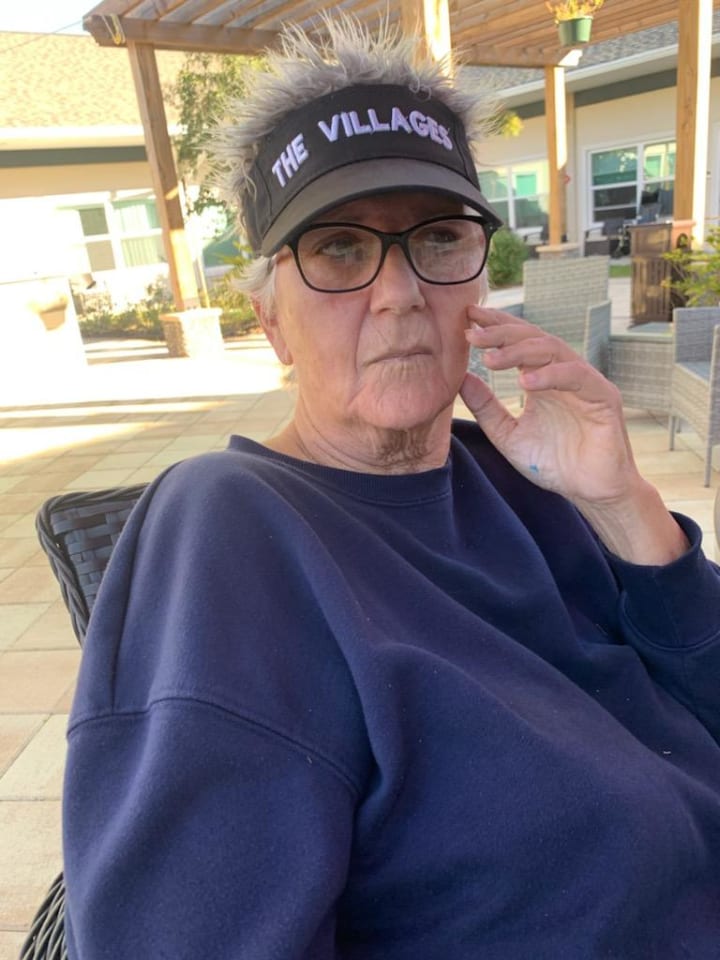
Q: What do you wish staff working in a Memory Care Community understood?
A: You have to understand this person is not only a patient, but a human being. They are someone's spouse or loved one. It takes a certain person to work in a Memory Care Facility. This is not Independent Living or Assisted Living. Memory Care requires a special kind of person. They're not easy to come by because the turnover in the Industry is incredible and I can understand why. It's not easy to do.
Q: Has this experience changed your philosophy on life?
A: I'm still me. Nothing's changed as far as my outlook on life. 2 months after my wife passed away I was ready to get my life back again. For me, it was 2 months of grieving. Then I started to venture out to try and find someone to fill her shoes. After 2 and a half months of that, I gave up. I have my wife's sister who is about as close as I can get to my actual wife. Of all the children in the family, they had the most in common. So it's working out great for us. We're both widows, as it turns out, so this is fate for us.
Q: What obstacles did you face as a primary caregiver?
A: The amount of work involved in caring for an Alzheimer's patient is incredible. In my case, my wife could do nothing. I mean the simplest little task she couldn't do. I could give her a key and say here open the door, she couldn't do it. I handed her a hanger and her blouse and told her to hang it, she couldn't do it.
Q: What advice do you have for someone, who's just been diagnosed?
A: You're in for a hard road. It's going to be a lot of work and it's progressively going to get worse. Deal with it the best you can for as long as you can. Do not put your loved one into a facility until you absolutely cannot handle it anymore, because they're not going to get the care in the facility that you're going to give them.
Q: Looking back is there any choice you would've made differently in your situation?
A: I should've hung in there a little longer. I don't know how long I would've had her in a state where I could've handled her. But I live with that. You know your wedding vows are 'til death do us part, boy that rings in my head. I spoke to the elders from the church and they told me I did take care of her. Well, not in the way I understood wedding vows. It's tough to live with.
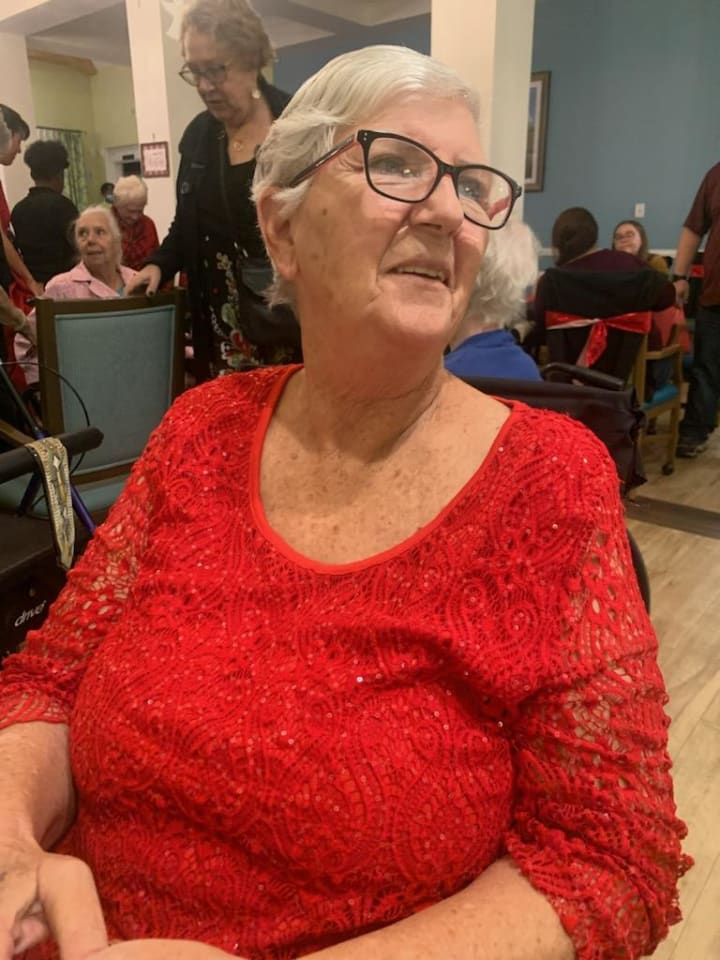
Q: What are the challenges during the transition from home to a Memory Care Community?
A: It was very heartbreaking. The day I dropped her off I had 2 of my sons with me, we had to sneak out of the building. We stepped outside and disappeared, she immediately started looking for me. My wife was in the facility 8 and a half months, she lost 60 pounds in that time looking for me.
Q: What are the challenges of family members of a resident in a Memory Care Community?
A: Knowing that, in my case, your loved one is terminally ill and you don't know how long it's going to take. You don't know what's going on at the facility when you're not there. It plays on your mind and it hurts. My wife fell down at the end, she banged her head on the ground. Was she pushed? Was she tripped? I didn't think she would fall but they do, they do fall. You just don't know. My wife fell in the house also, before I put her in the facility, which is one of the reasons I put her in. Because she could've fallen at the house and gotten seriously hurt and now what am I going to do? You run these questions in your head and you don't know the answers. You're not with them 24/7 while they're out of the house.
Q: How has this disease affected the social lives of you and your loved one? Share what you've done to combat loneliness.
A: 2 months after she was gone I was ready to get my life back. Now that I have a companion, her sister, it's making it easier for both of us. I depend on her, she depends on me and we get along great! You could say we fall into the boyfriend-girlfriend capacity. We never intend to marry or live together. Fortunately for me, I have Maria. If I did not have her, I don't know how I could handle single life at this stage of the game.
Q: What strategies have been successful to encourage your loved one to participate in Activities?
A: At home I bought coloring books, pencils, crayons. I bought puzzles but she couldn't do anything. I couldn't make a move without her being in my back pocket. The time we spent together there was no conversation, she just could not do that.
Q: How do you communicate when they struggle to express what they need?
A: Every day I would ask her how's it going? Not a word. She never said to me "I want to go home." Which was very strange. If things were not good, you'd think she would've said to me, "I'm not happy here. I want to go home." She never said get me out of here, because I probably would have.
Q: What techniques helped when your loved one felt emotional or combative?
A: I would grab a hold of her, she'd look me in the face and realize who I was and calm down. I don't know how people in the facility handled it. It took 2 or 3 people sometimes to change her. I'd be in the restroom with the staff and she'd be fighting them.
Q: What are the big contributors of a good Quality of Life? Is it continuing hobbies, building friendships, food, family, spiritual visits, or pet therapy?
A: Family, friends and Church.
Q: Are you a part of support groups or organizations for people in the same position? If so, which ones? How can they be found?
A: I was at United Methodist Church on Wednesday mornings for about a year and a half. That was a lifesaver for me. I highly recommend if you're a caregiver, to get support. To sit around and talk and get your emotions out. To listen to other people with the same situations, with variations, but going through the same thing. You won't get that from people who haven't experienced it. Like with friends you might've had forever, they're not living with it. You have to live with it to understand it.
Q: What brings you the most peace of mind?
A: At the very end, she wanted to go. I had to keep telling myself she couldn't make the phone call. She can't call up Hospice and say "I want to go there." I made the phone call for her to go to Hospice.
That's what I keep ringing in my head, I made the phone call to end her life because she couldn't do it for herself. Even though I believe if she could, she probably would have. We had the option of sending her back to the facility only to what? Go through this all over again? Falling and dealing with seizures too at the end. There was no point prolonging this, it only meant more suffering for her.
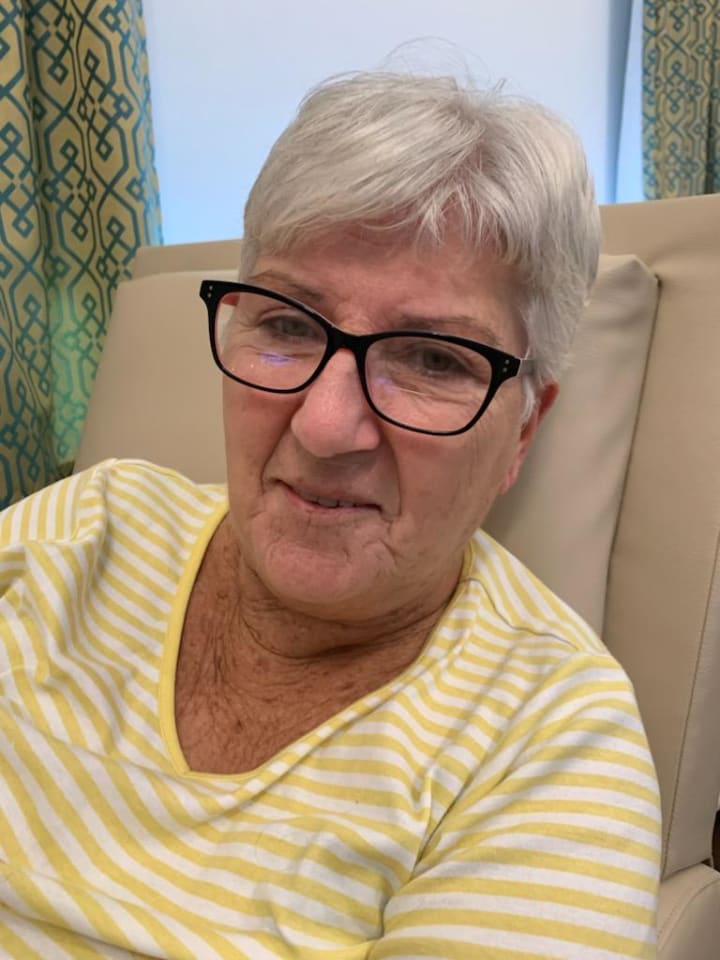
Q: What are small yet mighty joys when spending time together? Is it sitting together outside? Reading aloud, humming songs?
A: What I enjoyed is when she would sit with me, once I found her. At the end, she wouldn't even sit with me. I'd be sitting there and I'd say "C'mon sit down" and she'd keep walking.
Interviewee: Can I tell you something I witnessed you doing that impacted me? When you would give her massages on her feet. I thought "That's a devoted husband."
Maria: When you love somebody you do anything to help in any way, shape or form.
A: You do it because it's your job, when you're married, that's your job. Unfortunately, I feel like I gave up on her because it got to the point I couldn't do it anymore. Or she's going to get hurt or something's going to happen.
Interviewee: You don't know what could have occurred that could've been negative had you not made the choices you made.
A: I'm sure it would've gotten worse, even at home. I was at the point where I thought putting her in the facility would give me relief, there's no doubt about it. It wasn't good for her because of her separation anxiety, but it was for me.
Q: What gives you hope?
A: As a religious person, the hope is one day we'll be reunited. There's no way to know for sure. We don't know what heaven is like or even if it exists. We believe it does but we don't know what experience we're going to have when we get there. They say there's no marriage in heaven. Will you be reunited with your loved ones? I don't know but that's a hope I have.
Q: How is the grief of losing a loved one to Alzheimer's unique?
A: In my case, it was a relief. It was a blessing. You know it's coming and it's going to happen someday. When it finally does come it's a sigh of relief. Of course you're going to go through a lot of crying and a lot of grieving. Once you get over it, you say okay, let's move on.
Q: What ideas do you have to help Activities programs engage residents with Alzheimer's?
A: She would sit in the chair and hit the giant beach ball. Or she liked it when the dogs would come in. They need to fiddle with something. They sell mats with all kinds of stuff like trinkets on it. They have fake dogs, in my case I bought her a real dog. My wife wanted nothing to do with the dog but 3 years later I still got it. That dog now is my therapy.
Q: Maria, what was it like growing up with Alice?
Maria: When we were younger, Alice was Alice. She did what she wanted when she wanted. If she didn't like you she'd punch you out. She would be protective of her loved ones. I never even knew that because she was young when I left home.
We spent time baking, cooking, and learning all that because I loved it. I'd play with her, I had to keep them occupied in the kitchen. We lived in a very small apartment. There were 9 people and it was crowded. My father was ill for a long, long time with Rheumatoid Arthritis. So when he did work before he got worse, he worked nights driving a cab in Manhattan. So when he came home he needed to sleep. I had to keep these kids occupied, in the kitchen.
As she became a teenager we did do things but she doesn't remember too much because as soon as she was able to get out that door and go with friends she did. Alice would take off. She liked to put on heavy makeup - she was gorgeous.
When Cleopatra the movie came out, Alice fixed her eyes like Liz Taylor and our father got angry. Alice took it off, went out, put it back on, and made sure my father didn't see it on her. So whatever happened then, I didn't know the rest because I was busy. We became the closest of every one of them as we got older. She was my baby sister, we got along so well.
About the Creator
Danielle Eckhart
My heart lies with Fiction and Fantasy, especially when I have an unusual idea. Escapism and the art of storytelling are why I love to read and write. I want to give that gift to those who read my work, and have fun in the process!
Enjoyed the story? Support the Creator.
Subscribe for free to receive all their stories in your feed. You could also pledge your support or give them a one-off tip, letting them know you appreciate their work.


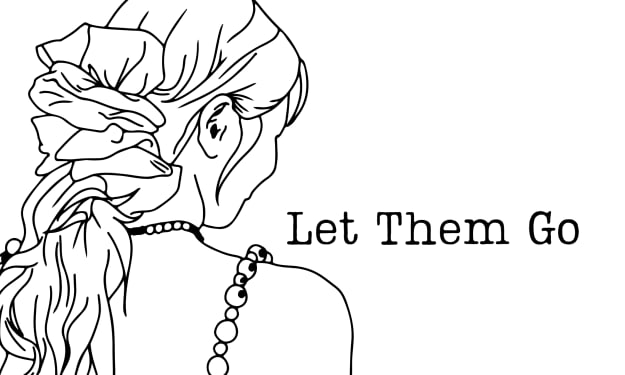



Comments
There are no comments for this story
Be the first to respond and start the conversation.